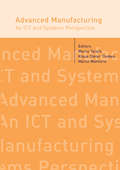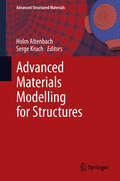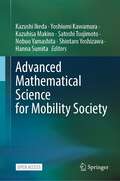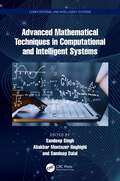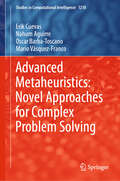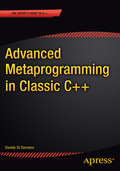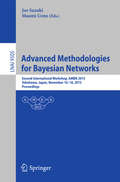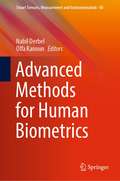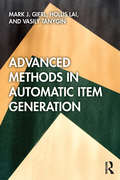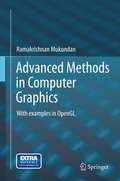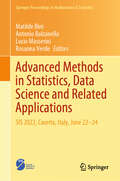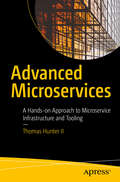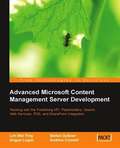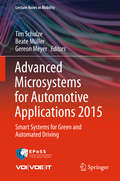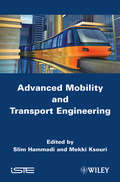- Table View
- List View
Advanced Manufacturing and Automation VIII (Lecture Notes in Electrical Engineering #484)
by Yi Wang Kesheng Wang Jan Ola Strandhagen Tao YuThis proceeding is a compilation of selected papers from the 8th International Workshop of Advanced Manufacturing and Automation (IWAMA 2018), held in Changzhou, China on September 25 - 26, 2018. Most of the topics are focusing on novel techniques for manufacturing and automation in Industry 4.0 and smart factory. These contributions are vital for maintaining and improving economic development and quality of life. The proceeding will assist academic researchers and industrial engineers to implement the concepts and theories of Industry 4.0 in industrial practice, in order to effectively respond to the challenges posed by the 4th industrial revolution and smart factory.
Advanced Manufacturing and Automation X (Lecture Notes in Electrical Engineering #737)
by Yi Wang Kesheng Wang Tao Yu Kristian MartinsenThis book presents selected papers from the 10th International Workshop of Advanced Manufacturing and Automation (IWAMA 2020), held in Zhanjiang, Guangdong province, China, on October 12-13, 2020. Discussing topics such as novel techniques for manufacturing and automation in Industry 4.0 and smart factories, which are vital for maintaining and improving economic development and quality of life, it offers researchers and industrial engineers insights into implementing the concepts and theories of Industry 4.0, in order to effectively respond to the challenges posed by the 4th industrial revolution and smart factories.
Advanced Manufacturing and Automation XI (Lecture Notes in Electrical Engineering #880)
by Yi Wang Kesheng Wang Tao Yu Kristian MartinsenThe proceedings collect selected papers from the 11th International Workshop of Advanced Manufacturing and Automation (IWAMA 2021), held in Zhengzhou Polytechnic, China on 11 - 12 October, 2021. Topics focusing on novel techniques for manufacturing and automation in Industry 4.0 are now vital factors for the maintenance and improvement of the economy of a nation and the quality of life. It will help academic researchers and engineering to implement the concept, theory and methods in Industry 4.0 which has been a hot topic. These proceedings will make valuable contributions to academic researchers, engineers in the industry for the challenges in the 4th industry revolution and smart factories.
Advanced Manufacturing. An ICT and Systems Perspective
by Klaus-Dieter Thoben Marco Taisch Marco MontorioManufacturing plays a vital role in European economy and society, and is expected to continue as a major generator of wealth in the foreseeable future. A competitive manufacturing industry is essential for the prosperity of Europe, especially in the face of accelerating deindustrialisation. This book provides a broad vision of the future of manufac
Advanced Materials Modelling for Structures: With Multi-scale Effects Or Under Multi-field Actions (Advanced Structured Materials #19)
by Holm Altenbach Serge KruchThis volume presents the major outcome of the IUTAM symposium on "Advanced Materials Modeling for Structures". It discusses advances in high temperature materials research, and also to provides a discussion the new horizon of this fundamental field of applied mechanics. The topics cover a large domain of research but place a particular emphasis on multiscale approaches at several length scales applied to non linear and heterogeneous materials. Discussions of new approaches are emphasised from various related disciplines, including metal physics, micromechanics, mathematical and computational mechanics.
Advanced Mathematical Science for Mobility Society
by Kazuhisa Makino Kazushi Ikeda Yoshiumi Kawamura Satoshi Tsujimoto Nobuo Yamashita Shintaro Yoshizawa Hanna SumitaThis open access book presents the mathematical methods for huge data and network analysis.The automotive industry has made steady progress in technological innovations under the names of Connected Autonomous-Shared-Electric (CASE) and Mobility as a Service (MaaS). Needless to say, mathematics and informatics are important to support such innovations. As the concept of cars and movement itself is diversifying, they are indispensable for grasping the essence of the future mobility society and building the foundation for the next generation. Based on this idea, Research unit named "Advanced Mathematical Science for Mobility Society" was established at Kyoto University as a base for envisioning a future mobility society in collaboration with researchers led by Toyota Motor Corporation and Kyoto University.This book contains three main contents.1. Mathematical models of flow2. Mathematical methodsfor huge data and network analysis3. Algorithm for mobility societyThe first one discusses mathematical models of pedestrian and traffic flow, as they are important for preventing accidents and achieving efficient transportation. The authors mainly focus on global dynamics caused by the interaction of particles. The authors discuss many-body particle systems in terms of geometry and box-ball systems. The second one consists of four chapters and deals with mathematical technologies for handling huge data related to mobility from the viewpoints of machine learning, numerical analysis, and statistical physics, which also includes blockchain techniques. Finally, the authors discuss algorithmic issues on mobility society. By making use of car-sharing service as an example of mobility systems, the authors consider how to construct and analyze algorithms for mobility system from viewpoints of control, optimization, and AI.
Advanced Mathematical Techniques in Computational and Intelligent Systems (Computational and Intelligent Systems)
by Aliakbar Montazer Haghighi Sandeep Singh Sandeep DalalThis book comprehensively discusses the modeling of real-world industrial problems and innovative optimization techniques such as heuristics, finite methods, operation research techniques, intelligent algorithms, and agent- based methods. Discusses advanced techniques such as key cell, Mobius inversion, and zero suffix techniques to find initial feasible solutions to optimization problems. Provides a useful guide toward the development of a sustainable model for disaster management. Presents optimized hybrid block method techniques to solve mathematical problems existing in the industries. Covers mathematical techniques such as Laplace transformation, stochastic process, and differential techniques related to reliability theory. Highlights application on smart agriculture, smart healthcare, techniques for disaster management, and smart manufacturing. Advanced Mathematical Techniques in Computational and Intelligent Systems is primarily written for graduate and senior undergraduate students, as well as academic researchers in electrical engineering, electronics and communications engineering, computer engineering, and mathematics.
Advanced Maya Texturing and Lighting
by Lee LanierIf you already understand the basics of Maya, the industry-leading 3D animation and effects software, you'll be ready to move on to the sophisticated topics in this updated edition of Advanced Maya Texturing and Lighting. Detailed, easy-to-follow instructions will teach you the real-world production secrets that professional animators use to achieve amazing results. In the second edition, you will find extensive and updated coverage of the latest theories and trends in addition to an enclosed CD with exclusive content to help you sharpen your skills.
Advanced Mechanics in Robotic Systems
by Nestor Eduardo Nava RodríguezHumans have always been fascinated with the concept of artificial life and the construction of machines that look and behave like people. As the field of robotics evolves, it demands continuous development of successful systems with high-performance characteristics for practical applications. Advanced Mechanics in Robotic Systems illustrates original and ambitious mechanical designs and techniques for developing new robot prototypes with successful mechanical operational skills. Case studies are focused on projects in mechatronics that have high growth expectations: humanoid robots,robotics hands,mobile robots,parallel manipulators, andhuman-centred robots.A good control strategy requires good mechanical design, so a chapter has also been devoted to the description of suitable methods for control architecture design. Readers of Advanced Mechanics in Robotic Systems will discover novel designs for relevant applications in robotic fields, that will be of particular interest to academic and industry-based researchers.
Advanced Metaheuristics: Novel Approaches for Complex Problem Solving (Studies in Computational Intelligence #1210)
by Erik Cuevas Nahum Aguirre Oscar Barba-Toscano Mario Vásquez-FrancoThis book examines a series of strategies designed to enhance metaheuristic algorithms, focusing on critical aspects such as initialization methods, the incorporation of Evolutionary Game Theory to develop novel search mechanisms, and the application of learning concepts to refine evolutionary operators. Furthermore, it emphasizes the significance of diversity and opposition in preventing premature convergence and improving algorithmic efficiency. These strategies collectively contribute to the development of more adaptive and robust optimization techniques. The book was designed from a teaching standpoint, making it suitable for undergraduate and postgraduate students in Science, Electrical Engineering, or Computational Mathematics. Furthermore, engineering practitioners unfamiliar with metaheuristic computations will find value in the application of these techniques to address complex real-world engineering problems, extending beyond theoretical constructs.
Advanced Metaprogramming in Classic C++
by Davide Di GennaroTake a detailed and intense look into template metaprogramming (TMP) using classic C++. Tackle language aspects, design patterns, examples and applications, with special emphasis on small reusable techniques that will improve the quality of daily work. Advanced Metaprogramming in Classic C++: Third Edition is a book to sit with and learn from. Users of its prior editions point out that they come back to it over and over. This edition enhances the readability and clarity of the discussion. The two newer standards are not used in the code so that the examples can be rich, illustrate the point, and be run with confidence. The code can be readily adapted to include the elements of the Modern C++ standards. The gain for the reader is that TMP is presented in the book as a set of techniques that will enable a new style to your C++ coding while making it exceptionally clear and efficient. The approach in the book is used to maximize compatibility and clearly illustrate the techniques, enabling the reader to comprehend difficult material without the burdens of compiler errors, and other unnecessary complexities and enabling a much more intense treatment of the subject. For those interested in Modern C++, all subsequent additions to the C++ language are fully compatible with the code in this book and users familiar with them can leverage the techniques introduced in C++XX to make the patterns in this book even more powerful. There is a chapter that discusses issues regarding the two newer standards and the basics needed to program for the newer standards are readily available online. What makes the book exceptional is the level of understanding of the concepts involved imparted by the author. This is not just a rote overview of metaprogramming. You will truly understand difficult topics like static assertions, how to write metafunctions, overload resolution, lambda expressions, and many others. More than that, you will work through them with practical examples guided by the author's frank explanations. This book requires you to think and to learn and to understand the language so that you can program at a higher level. What you'll learn What templates and the small object toolkit are, and how to use them How to do overload resolution How to do metaprogramming with interfaces, algorithms, functors and refactoring How to work with code generators What is opaque type principle and how to use it How to work with debugging templates and more A chapter devoted to issues surrounding C++0x and C++14 Who this book is for This book is for experienced C++ programmers who want to learn more. Table of Contents Part I 1. Templates 2. Small Object Toolkit Part II 3. Static Programming 4. Overload Resolution 5. Interfaces 6. Algorithms 7. Code Generators 8. Functors 9. Opaque Type Principle Part III 10. Refactoring 11. Debugging Templates 12. C++0X 13. Appendix A: Exercises 14. Appendix B: Bibliography
Advanced Methodologies for Bayesian Networks: Second International Workshop, AMBN 2015, Yokohama, Japan, November 16-18, 2015. Proceedings (Lecture Notes in Computer Science #9505)
by Joe Suzuki Maomi UenoThis volume constitutes the refereed proceedings of the Second International Workshop on Advanced Methodologies for Bayesian Networks, AMBN 2015, held in Yokohama, Japan, in November 2015. The 18 revised full papers and 6 invited abstracts presented were carefully reviewed and selected from numerous submissions. In the International Workshop on Advanced Methodologies for Bayesian Networks (AMBN), the researchers explore methodologies for enhancing the effectiveness of graphical models including modeling, reasoning, model selection, logic-probability relations, and causality. The exploration of methodologies is complemented discussions of practical considerations for applying graphical models in real world settings, covering concerns like scalability, incremental learning, parallelization, and so on.
Advanced Methods for Geometric Modeling and Numerical Simulation (Springer INdAM Series #35)
by Hendrik Speleers Carlotta GiannelliThis book gathers selected contributions presented at the INdAM Workshop “DREAMS”, held in Rome, Italy on January 22−26, 2018. Addressing cutting-edge research topics and advances in computer aided geometric design and isogeometric analysis, it covers distinguishing curve/surface constructions and spline models, with a special focus on emerging adaptive spline constructions, fundamental spline theory and related algorithms, as well as various aspects of isogeometric methods, e.g. efficient quadrature rules and spectral analysis for isogeometric B-spline discretizations. Applications in finite element and boundary element methods are also discussed. Given its scope, the book will be of interest to both researchers and graduate students working in these areas.
Advanced Methods for Human Biometrics (Smart Sensors, Measurement and Instrumentation #40)
by Nabil Derbel Olfa KanounThe book highlights recent developments in human biometrics, covering a wide range of methods based on biological signals, image processing, and measurements of human characteristics such as fingerprints and iris or medical characteristics. Human Biometrics is becoming increasingly crucial in forensics security and medicine. They provide a solid basis for identifying individuals based on unique physical characteristics or diseases based on characteristic biomedical measurements. As such, the book offers an essential reference guide about biometry methods for students, engineers, designers, and technicians.
Advanced Methods in Automatic Item Generation
by Mark J. Gierl Hollis Lai Vasily TanyginAdvanced Methods in Automatic Item Generation is an up-to-date survey of the growing research on automatic item generation (AIG) in today’s technology-enhanced educational measurement sector. As test administration procedures increasingly integrate digital media and Internet use, assessment stakeholders—from graduate students to scholars to industry professionals—have numerous opportunities to study and create different types of tests and test items. This comprehensive analysis offers thorough coverage of the theoretical foundations and concepts that define AIG, as well as the practical considerations required to produce and apply large numbers of useful test items.
Advanced Methods in Computer Graphics: With examples in OpenGL
by Ramakrishnan MukundanThis book brings together several advanced topics in computer graphics that are important in the areas of game development, three-dimensional animation and real-time rendering. The book is designed for final-year undergraduate or first-year graduate students, who are already familiar with the basic concepts in computer graphics and programming. It aims to provide a good foundation of advanced methods such as skeletal animation, quaternions, mesh processing and collision detection. These and other methods covered in the book are fundamental to the development of algorithms used in commercial applications as well as research.
Advanced Methods in Statistics, Data Science and Related Applications: SIS 2022, Caserta, Italy, June 22–24 (Springer Proceedings in Mathematics & Statistics #467)
by Rosanna Verde Matilde Bini Antonio Balzanella Lucio MasseriniThis book contains a selection of the improved contributions submitted by participants at the conference of the Italian Statistical Society - SIS 2022 held in Caserta 22-24 June 2022. The scientific community of Italian statistics, which gathers around the SIS, is paying particular attention to the development of statistical techniques increasingly oriented toward the processing of large data, mainly, of complex data. The main goal is to provide the analysis of the data and the interpretability of the obtained results, with a view to decision support and the reliability of the data outcomes. The aim of this volume is to show some of the most relevant contributions of statistical and data analysis methods in preserving the quality of the information to be processed, especially when it comes from different, often non-official sources; as well as in the extraction of knowledge from complex data (textual, network, unstructured and multivalue) and in the explicability of results. Data Science today represents a broad domain of knowledge development from data, where statistical and data analysis methods can make an important contribution in the different domains where data management and processing are required. This volume is addressed to researchers but also to Ph.D. and MSc students in the field of Statistics and Data Science to acquaint them with some of the most recent developments towards which statistical research is orienting, in prevalence in Italy.
Advanced Methods of Solid Oxide Fuel Cell Modeling (Green Energy and Technology)
by Jarosław Milewski Pierluigi Leone Massimo Santarelli Konrad ŚwirskiFuel cells are widely regarded as the future of the power and transportation industries. Intensive research in this area now requires new methods of fuel cell operation modeling and cell design. Typical mathematical models are based on the physical process description of fuel cells and require a detailed knowledge of the microscopic properties that govern both chemical and electrochemical reactions. Advanced Methods of Solid Oxide Fuel Cell Modeling proposes the alternative methodology of generalized artificial neural networks (ANN) solid oxide fuel cell (SOFC) modeling. Advanced Methods of Solid Oxide Fuel Cell Modeling provides a comprehensive description of modern fuel cell theory and a guide to the mathematical modeling of SOFCs, with particular emphasis on the use of ANNs. Up to now, most of the equations involved in SOFC models have required the addition of numerous factors that are difficult to determine. The artificial neural network (ANN) can be applied to simulate an object's behavior without an algorithmic solution, merely by utilizing available experimental data. The ANN methodology discussed in Advanced Methods of Solid Oxide Fuel Cell Modeling can be used by both researchers and professionals to optimize SOFC design. Readers will have access to detailed material on universal fuel cell modeling and design process optimization, and will also be able to discover comprehensive information on fuel cells and artificial intelligence theory.
Advanced Microservices: A Hands-on Approach to Microservice Infrastructure and Tooling
by Thomas Hunter IIUse the many types of tools required to navigate and maintain a microservice ecosystem. This book examines what is normally a complex system of interconnected services and clarifies them one at a time, first examining theoretical requirements then looking at concrete tools, configuration, and workflows. Building out these systems includes many concerns such as containerization, container orchestration, build pipelines and continuous integration solutions, automated testing, service discovery, logging and analytics. You will examine each of these tools and understand how they can be combined within an organization. You will design an automated build pipeline from Pull Request to container deployment, understand how to achieve High Availability and monitor application health with Service Discovery, and learn how to collaborate with other teams, write documentation, and describe bugs. Covering use of Jenkins, Docker, Kubernetes, the ELK stack (Elasticsearch, Logstash, and Kibana), and StatsD and Grafana for analytics, you will build on your existing knowledge of Service-Oriented Architecture and gain an advanced, practical understanding of everything from infrastructure development to team collaboration. What You'll Learn Design an API to be convenient for developers to consume. Deploy dynamic instances of Microservices and allow then to discover each other. Track the health of a Microservice and be notified in case of degraded performance. Write effective documentation and communicate efficiently with other teams. Who This Book Is For Those who would like a better understanding of System Oriented Architecture. Those who would like to break a monolith into smaller Microservices. Those who are familiar with Microservices and would like a better understanding of peripheral technologies.
Advanced Microsoft Content Management Server Development
by Andrew Connell Angus LoganThis book is written for developers who want to the skills to fully exploit the power of MCMS and SPS. The book presumes a working knowledge of MCMS, the .NET Framework and familiarity with the C# language. All the code examples are in C#.
Advanced Microsoft Word Windows Vista: Desktop Publishing 2007
by Joanne ArfordThis text is designed for the student to complete projects and assessments on a computer running a standard installation of Microsoft Office 2007, Professional Edition, and the Microsoft Windows Vista operating system.
Advanced Microsoft® Office Documents 2007 Edition Inside Out
by Stephanie Krieger<div xmlns="http://www.w3.org/1999/xhtml"><p>Learn how to create dynamic documents with impact by using the 2007 Microsoft Office system from the inside out! This book packs hundreds of time-saving solutions, troubleshooting tips, and workarounds, all in concise, fast-answer format.</p></div>
Advanced Microsoft® Office Documents 2007 Edition Inside Out
by Stephanie KriegerDig deep into Microsoft Office Word 2007, Excel2007, and PowerPoint 2007--and create robust documents that deliver results. This book is packed with advanced timesaving tips and troubleshooting methods to help you learn the smartest, simplest ways to create powerful documents. Discover how the experts approach document production--and reach new levels of mastery! Exploit the power of tables, Themes, and templates Produce professional-quality graphics using new SmartArt diagrams, custom shapes, and other drawing tools Customize and reuse content with Building Blocks and Content Controls Learn advanced techniques for managing slide masters and custom layouts for effective presentations Design PivotTables for more powerful data analysis and reporting Build sophisticated Excel 2007 chart types and customize chart elements Use Microsoft Visual Basic for Applications (VBA) to automate document production and customize templates Customize the Office Fluent Ribbon and troubleshoot your documents with Office Open XML CD includes: Fully searchable eBook Sample documents and templates VBA and Office Open XML code samples Author webcasts--see advanced techniques in action Tool for binding custom XML to content controls in Word 2007 Files for customizing the Fluent Ribbon Links to articles blogs, and developer learning resources Windows Vista Product Guide eReference and other eBooks A Note Regarding the CD or DVD The print version of this book ships with a CD or DVD. For those customers purchasing one of the digital formats in which this book is available, we are pleased to offer the CD/DVD content as a free download via O'Reilly Media's Digital Distribution services. To download this content, please visit O'Reilly's web site, search for the title of this book to find its catalog page, and click on the link below the cover image (Examples, Companion Content, or Practice Files). Note that while we provide as much of the media content as we are able via free download, we are sometimes limited by licensing restrictions. Please direct any questions or concerns to booktech@oreilly.com.
Advanced Microsystems for Automotive Applications 2015: Smart Systems for Green and Automated Driving (Lecture Notes in Mobility)
by Gereon Meyer Beate Müller Tim SchulzeThis edited volume presents the proceedings of the AMAA 2015 conference, Berlin, Germany. The topical focus of the 2015 conference lies on smart systems for green and automated driving. The automobile of the future has to respond to two major trends, the electrification of the drivetrain, and the automation of the transportation system. These trends will not only lead to greener and safer driving but re-define the concept of the car completely, particularly if they interact with each other in a synergetic way as for autonomous parking and charging, self-driving shuttles or mobile robots. Key functionalities like environment perception are enabled by electronic components and systems, sensors and actuators, communication nodes, cognitive systems and smart systems integration. The book will be a valuable read for research experts and professionals in the automotive industry but the book may also be beneficial for graduate students.
Advanced Mobility and Transport Engineering
by Slim Hammadi Mekki KsouriMultimodal transport network customers need to be directed during their travels. A travel support tool can be offered by a Multimodal Information System (MIS), which allows them to input their needs and provides them with the appropriate responses to improve their travel conditions. The goal of this book is to design and develop methodologies in order to realize a MIS tool which can ensure permanent multimodal information availability before and during travel, considering passengers’ mobility. The authors propose methods and tools that help transport network customers to formulate their requests when they connect to their favorite information systems through PC, laptop, cell phone, Portable Digital Assistant (PDA), etc. The MIS must automatically identify the websites concerning the customer’s services. These sites can, in fact, represent transport services, cultural services, tourist services, etc. The system should then be able to collect the necessary travel information from these sites in order to construct and propose the most convenient information according to the user’s requests. Contents 1. Agent-oriented Road Traffic Simulation, René Mandiau, Sylvain Piechowiak, Arnaud Doniec and Stéphane Espié. 2. An Agent-based Information System for Searching and Creating Mobility-aiding Services, Slim Hammadi and Hayfa Zgaya. 3. Inter-vehicle Services and Communication, Sylvain Lecomte, Thierry Delot and Mikael Desertot. 4. Modeling and Control of Traffic Flow, Daniel Jolly, Boumediene Kamel and Amar Benasser. 5. Criteria and Methods for Interactive System Evaluation: Application to a Regulation Post in the Transport Domain, Houcine Ezzedine, Abdelwaheb Trabelsi, Chi Dung Tran and Christophe Kolski.



